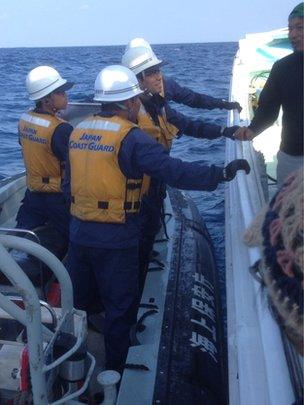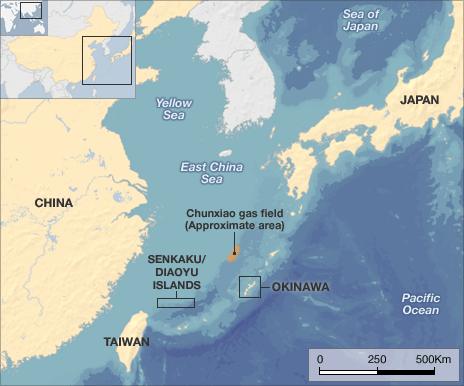Watching Japan and China square off in East China Sea
- Published
Rupert Wingfield-Hayes looks at the dispute over the islands
Who do the Senkaku or Diaoyu Islands belong to? The short answer is I don't know.
Japan once had a small colony there for a few decades. But they left in the 1940s.
No-one has lived on the remote islands since the end of WWII. As a piece of real estate they are not very attractive. Only one is big enough to be, just possibly, habitable.
But to therefore dismiss the islands as an irrelevance would be a mistake.
China has long claimed them, and is now for the first time aggressively asserting that claim. It is equally clear Japan is not about to give them up, and is possibly prepared to fight to keep them. It is, in other words, a very dangerous situation.
The only way to get to the islands is by fishing boat. It is not a particularly pleasant journey. In late October, the seas were choppy. The small 12m (39ft) fishing boat we had chartered pitched and rolled constantly. Inside the cabin the engine-noise was almost unbearable.
After 10 hours ploughing through the waves, the islands hove in to view through the pre-dawn light.
But between our boat and the islands were two large, white coastguard cutters. Out of the gloom, a pair of speedboats came skipping across the waves towards us. The coastguard officers were extremely polite, but made it clear we must stay at least one mile off shore.
Japan has banned all civilians, including Japanese, from landing on the island. It is to stop right-wing Japanese nationalists, who have in the past attempted to build a lighthouse and other structures there. It is exactly the same reason the Japanese government gives for "nationalising" the islands in September; to stop right-wing nationalists taking control of them.
When Japan and China established diplomatic relations in 1972, the leaders of both countries agreed to put the issue of the Senkaku/Diaoyu islands to one side; to let future, supposedly wiser, generations deal with the problem. They both also agreed that neither side would unilaterally change the status quo.
That is what China says Japan has done by "nationalising" the island. Beijing is now using that alleged change to justify its own assertion of sovereignty.
Brazen tactics
As the sun rose higher over the island the radio on board our fishing boats crackled into life. It was the Japanese coastguard. "Chinese ships are heading in this direction, please immediately move around to the north of the island!"
Over the horizon we could see them coming: first two, then two more. Large, white Chinese ships with four blue stripes down the side.
Our fishing boat captain didn't need asking twice. He was off. We sped round to the north of the main island.
But the Chinese boats kept on coming.

The Japanese coastguards were polite but firm in insisting the BBC team kept a mile from shore
A Japanese P3 Orion surveillance plane then appeared from the east, swooping back and forth over the Chinese ships. The Japanese coastguard was now extremely nervous.
"Please stop filming and leave the area immediately," came the message from the radio.
"They're worried the Chinese will come and board us," said the captain. If that happened it could turn into an international incident.
I don't think that was really ever the Chinese intention. Their job was pretty simple, to brazenly sail through Japanese-controlled waters, while loudly proclaiming them to actually be Chinese.
The Chinese tactics are aggressive, but not too aggressive. The ships are "civilian" not naval. The aim is to wear down the Japanese resolve, to make Chinese control of the waters around the islands at least equal to that of the Japanese.
The Japanese government does not appear to have a counter strategy. We watched as the Japanese coastguard ships shadowed the Chinese ships, always keeping a distance.
After the anti-Japanese violence in China in September, Tokyo is understandably reluctant to do anything to antagonise Beijing further.
But China's communist leadership, caught up with the 18th party congress, has shown no interest in dialogue.
Indeed, President Hu Jintao's speech at the opening of the congress last week was a very public statement of China's determination to build a powerful blue-water navy and enforce its territorial claims.
Such rhetoric is making people in Japan nervous of China's intentions and more susceptible to the calls of right-wingers like Shintaro Ishihara, the former governor of Tokyo. He is one of many on the right who say it is time for Japan to scrap its pacifist constitution, and prepare to defend itself.

The Senkaku/Diaoyu issue complicates efforts by Japan and China to resolve a dispute over oil and gas fields in the East China Sea that both claim